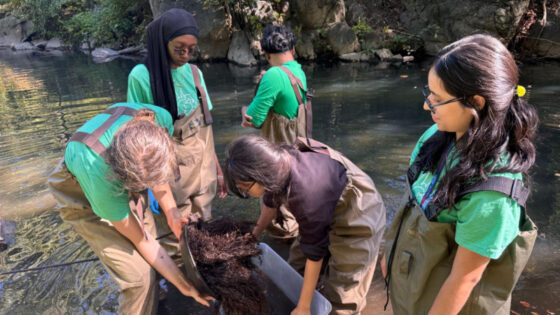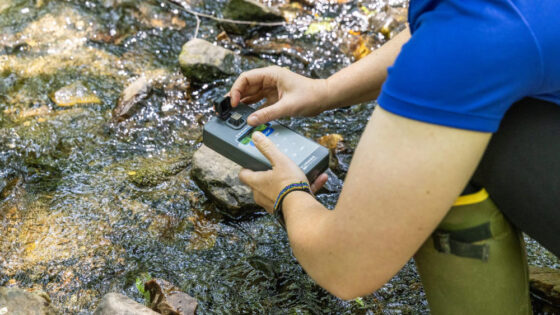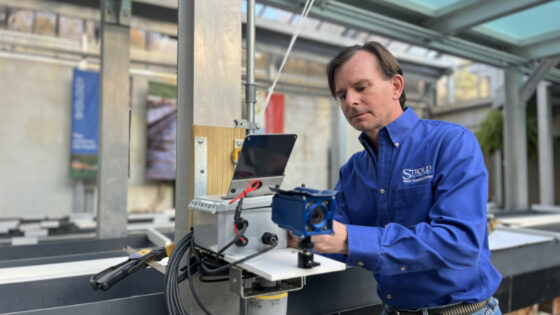A team of environmental education professionals from across Pennsylvania has been recognized with the prestigious 2020 Outstanding Environmental Education Program Award. Offered annually by the Pennsylvania Association of Environmental Educators (PAEE), the award recognizes an exemplary or innovative environmental education program that serves as a model of excellence throughout the Commonwealth.
This year’s honor goes to the Pennsylvania Meaningful Watershed Educational Experience (MWEE) Ambassador Training Program, a key initiative of the Pennsylvania Watershed Education Task Force funded by a 2017-2020 National Oceanic and Atmospheric Administration Bay Watershed Education and Training (NOAA B-WET) grant.
“I am thrilled to accept the 2020 Outstanding Environmental Education Program Award on behalf of all of the partners of the PA MWEE Ambassador Training Program,” says Steve Kerlin, Ph.D., Stroud Water Research Center director of education and principal investigator for the grant. “While working to advance statewide environmental literacy and meaningful watershed education for K-12 students and educators, this training program has engaged nearly 500 non-formal educators, in-service classroom teachers, pre-service teachers/college students, and school administrators in over twenty professional development workshops across Pennsylvania.”
The award-winning program’s origin can be traced back to 2014, when the Chesapeake Bay Watershed Agreement and the Pennsylvania Environmental Literacy Plan identified a pressing need for MWEE support in the 500 public school districts and over 200 other schools in Pennsylvania. The MWEE framework addresses academic standards through learner-centered investigations into local environmental issues that lead to informed action and civic engagement. Four essential elements guide students through their discovery and protection of water resources: Issue Definition; Outdoor Field Experiences; Synthesis and Conclusions; and Stewardship and Civic Action.
“This holistic approach leads to higher levels of student achievement and guides a better citizenry to become stewards of their local environments — a populace that will support stormwater management, plant trees, care about clean water, and more,” says Kerlin. “However, it is difficult for one teacher alone to complete all of the MWEE framework’s four essential elements. When our Task Force first assembled in 2017 thanks to NOAA B-WET grant funding, our first priority was creating and connecting a statewide cadre of MWEE-trained educators who could strengthen each other’s MWEE implementation every step of the way.”
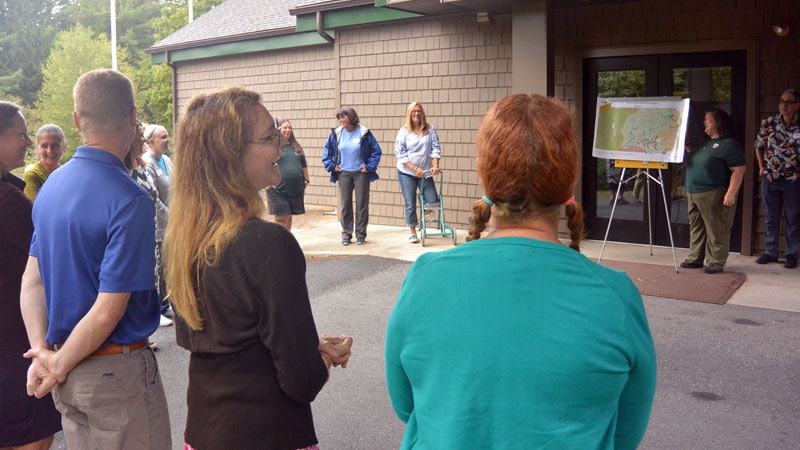
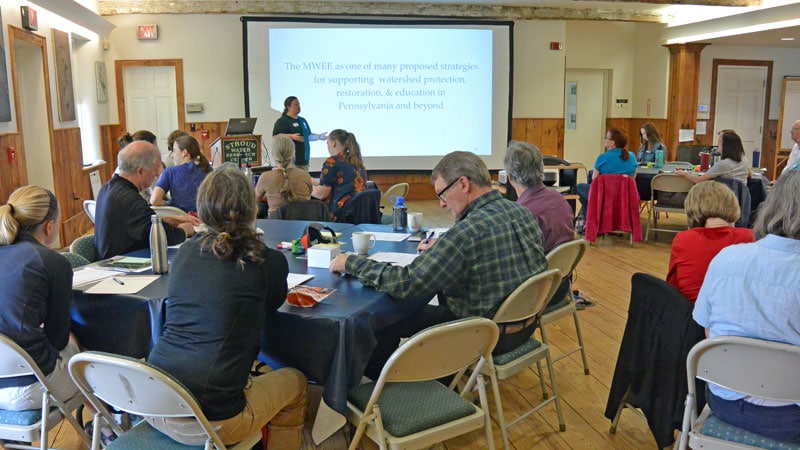
The result was the PA MWEE Ambassador Training Program, an intensive project that required a diverse team of facilitators who could contribute highly specialized perspectives to the common goal.
“In our first three years as the PA Watershed Education Task Force, we built a knowledgeable and highly-skilled Professional Development (PD) Committee to create, organize, and deliver a plethora of unique MWEE Ambassador Training Workshops all over Pennsylvania,” recalls Carissa Longo, a member of the Task Force’s core leadership team and the environmental education program coordinator at the Department of Conservation and Natural Resources (DCNR) – Pennsylvania State Parks. “It was rewarding to work with such an experienced team of partners, who quickly meshed together despite being employed by different state agencies, universities, schools, and non-profit organizations.”
Environmental education leaders who comprised this PD Committee with Longo included Steve Kerlin, Ph.D., and Mandy Nix, Stroud Water Research Center; Tamara Peffer and Judd Pittman, PA Department of Education; Gilbert Myers, PA Department of Environmental Protection; Tarrea Potter and Emily Thorpe, Chesapeake Bay Foundation; Jennifer Fetter, Penn State Extension; Dan Daneker, Ed.D., and Kerrie Snavely, Conestoga Valley School District; Paul Joyce, Ed.D., West Chester Area School District; Jess McGuire, Halifax Area School District; Jessica Kester, PAEE; Tamara Peffer and Judd Pittman, PA Department of Education; and Nanette Marcum-Dietrich, Ph.D., Millersville University.
Together, they delivered free, high-quality trainings tailored to four target audiences: non-formal environmental educators, classroom teachers, school administrators, and pre-service teachers. In addition to offering Act 48 professional education hours to teachers and certifying participants as PA MWEE Ambassadors, the trainings included advanced watershed education skill-building in topics like macroinvertebrate bioassessment, water chemistry, and stormwater management. Each workshop also presented an innovative opportunity for educators to forge connections with regional partners, explore new watershed education resources, and invigorate their confidence in teaching MWEEs.
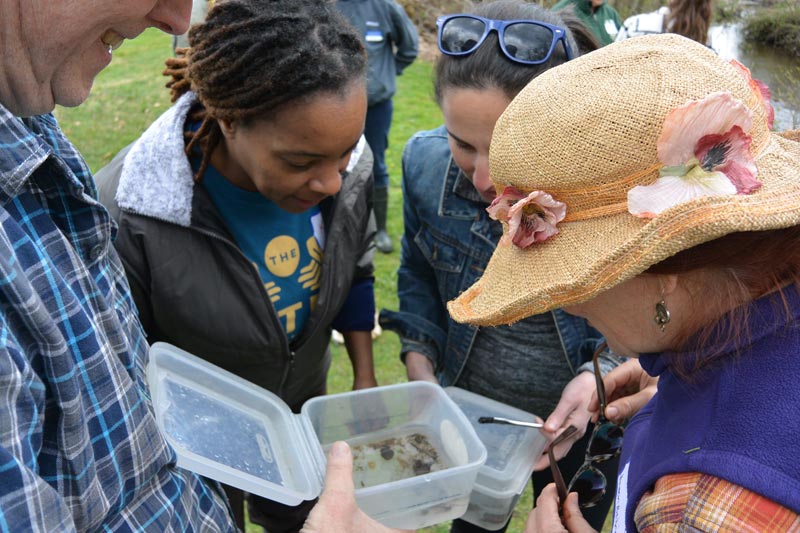
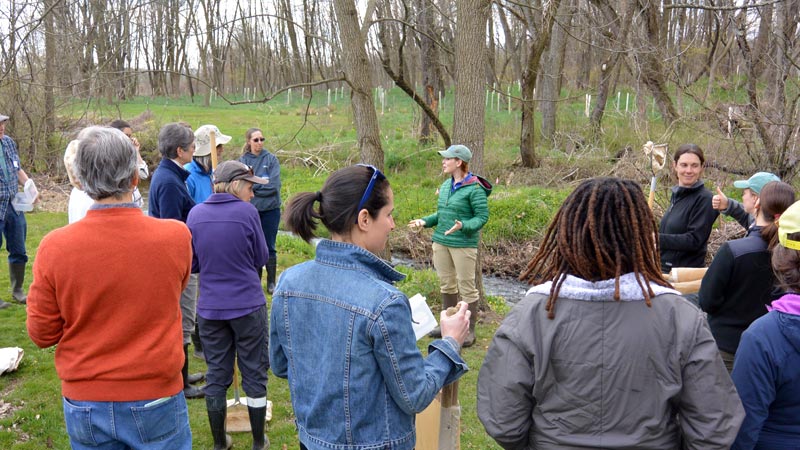
“The Task Force’s professional development trainings created a new cadre of trained MWEE Ambassadors, who are now fostering K-12 stewardship and civic action projects across the Commonwealth,” says Bert Myers, director of environmental education at the Department of Environmental Protection (DEP) and member of the Task Force’s core leadership team. “These student-led projects have real-world impacts on the environment by reducing sediment loads and improving water quality within each of Pennsylvania’s watersheds.”
The connections and collaborations did not end with the MWEE Ambassador Training workshops. “The trainings also helped launch and expand the online inventory of Environmental Education (EE) Providers in Pennsylvania, which is hosted on the PAEE website,” says PAEE President-Elect and Task Force leadership team member Jessica Kester. “Teachers, school administrators, homeschoolers, caregivers, and other educators across Pennsylvania can use our EE Providers Network to discover potential MWEE partners and unique environmental education opportunities in their local watershed.”
This momentum for MWEEs continues with a second NOAA B-WET grant awarded to the PA Watershed Education Task Force for 2020-2022. The new grant funds an additional two years of professional development for educators new to the MWEE framework, as well as advanced support for veteran MWEE Ambassadors and other capacity-building initiatives.
“In the new grant cycle, our work expands beyond the initial cadre of MWEE Ambassadors to reach new audiences, enhance support networks, and further increase the depth and breadth of our capacity,” says Tamara Peffer, environment and ecology curriculum advisor at the PA Department of Education (PDE). Peffer shepherds the Task Force’s efforts to incorporate the vision of the Pennsylvania Environmental Education Act, Pennsylvania Environmental Literacy Plan, and Chesapeake Bay Watershed Agreement. “We will also be offering a tiered approach to professional development that spans from introductory sessions onward to include advanced content sessions and school administrator continuing education.”
With the new NOAA B-WET funding, the PA Watershed Education Task Force is helping close the gaps in statewide environmental literacy and grow Pennsylvania’s MWEE capacity — one watershed at a time.
NOAA Grant #NA17NMF4570274

